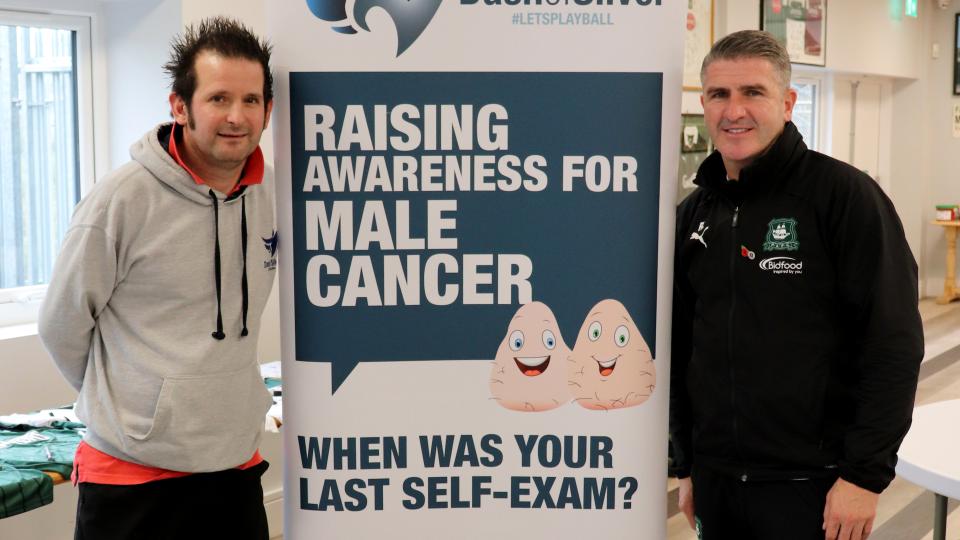Argyle charity partner and male cancer charity Dash of Silver made a special visit to Home Park this month as part of the activities marking International Men’s Day.
Dan Silver, who founded Dash of Silver following his diagnosis of testicular cancer in 2009, presented an interactive session to the men’s first team and staff at the Green Taverners Suite to raise awareness for testicular cancer.
Dan presented personal advice and information on what to look for, diagnosis, and support available to those going through cancer treatment. Players were encouraged to interact with medical props and were amazed not only at Dan’s personal experience but at some of the facts and information he presented.
Pilgrims captain Joe Edwards said, “It was great to have Dan in to do a talk on testicular cancer. No one can be too brave, and it will make the boys realise that they need to be checking regularly. If you find something you’re unsure of, get it checked out. We’re all thankful to Dan for coming in and raising awareness.”
Dash of Silver Founder Dan Silver added, “It is so important to raise awareness for male cancers. Men are notoriously bad at seeking help and, with an early diagnosis being so important, it is vital men don’t let their pride get in the way.
“It was great to speak with the Argyle players and staff, not only as a massive fan but also due to the demographic of the players. Testicular cancer is most common in young men, especially those aged between 15 and 49.”
It is important to educate men on how to self-examine. Players were given medical props where they had to try to find the lumps in the prosthetic testicle, which helps understand what to look for.
The session concluded with a question-and-answer session, giving players and staff the opportunity to get advice and extend their learning and understanding of male cancers, with Dan sharing stories of his own experiences.
Argyle charity partner Dash of Silver delivers care packages to patients in hospitals going through recovery. Packages include essentials like slippers, toiletries, and Amazon Kindles to keep patients entertained and make their stay more comfortable.
Dan continued: “Remember guys, don’t let pride get in the way, be strong, be brave, keep checking and if you find anything get it checked out straight away!”
Club Ambassador Gary Sawyer added: “It was very insightful for the lads and for me personally. It was great to have Dash of Silver in, especially as Dan has been through testicular cancer himself. The props were great as they helped everyone understand what to look for.
“I would advise anyone who finds a lump that it is important you get it checked at the first sign.”
You can learn more about Dan’s story, find out more about his charity, or donate by visiting the Dash of Silver website.
How common is testicular cancer?
Around 2,400 men are diagnosed each year in the UK, making it around the 17th most common type of cancer. There are around 60 deaths in the UK each year, and testicular cancer accounts for 1% of all new cancer cases in males in the UK.
At what age can you be diagnosed?
The most common age to be diagnosed is between 15 and 49, although rates in the UK are highest in males between 30 and 34. It should be noted that testicular cancer can occur at any age, so it is always important to check yourself and seek medical advice at the earliest opportunity.
What are the main barriers to diagnosis?
It’s important to realise that every person is different. Each person has a different body and pain threshold. You can be the toughest person on the outside but very fragile inside and that can affect how you react.
Men are notoriously bad at seeking help and, with an early diagnosis being so important, it is vital that men don’t let their pride get in the way.
It is also important to ensure men are educated on what to look for. There is a wealth of advice online and through speaking with your GP. Our workshops provide advice and medical props that allow you to experience exactly what a tumour would feel like.
Listen to your body, check yourself regularly and don’t ignore any symptoms.
How important is it to get an early diagnosis?
Early detection is vital. As with any ache, swelling or discomfort, you must visit your GP right away. If you feel you are not satisfied with their diagnosis, always demand a second opinion to be sure. Time frame is very important as leaving things too long can make things worse.
What are the types of symptoms you may experience?
Typical symptoms are a painless swelling or lump in one of the testicles, or any change in shape or texture of the testicles. The swelling or lump can be about the size of a pea but may be larger. Most lumps or swellings in the scrotum are not in the testicle and are not a sign of cancer, but they should never be ignored.
There are many other symptoms to look out for. It is possible to have them all at the same time or to only experience some of the following:
- Headaches
- Muscle aches in the groin
- Loss of appetite/loss of weight
- Blurred vision
- Discomfort everywhere and especially around the lower back
- Swelling around either or both testicles
For a comprehensive list of symptoms, you can visit https://www.nhs.uk/conditions/testicular-cancer/symptoms/
What can men do to ensure they achieve an early diagnosis?
The first, and simplest thing you can do is educate yourself on what to feel for, and to make sure you self-examine every day. If you notice anything unusual or have any other symptoms, it is vital you see your GP as soon as possible.
It is still important to remember that not all lumps are cancerous, but it is always safer to get checked. Your GP would much rather see you for a false alarm, than not see you at all and miss the opportunity of an early diagnosis.
In England & Wales, almost all men (99%) survive for a year or more after diagnosis and 98% survive 5 years or more [NHS.UK]
If you have any concerns, you should consult your GP immediately. For further advice, information and support you can visit the following websites:
https://www.nhs.uk/conditions/testicular-cancer/
https://www.cancerresearchuk.org/about-cancer/testicular-cancer
https://www.macmillan.org.uk/cancer-information-and-support/testicular-cancer


